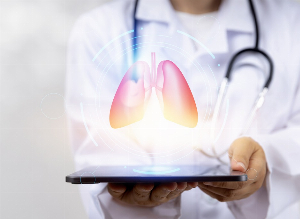Lung cancer: What are the latest advances in research?
Published Nov 29, 2021 • By Claudia Lima
Lung cancer is the third most common cancer and the leading cause of cancer-related deaths in the US. Treating lung cancer patients and improving their quality of life involves a range of medical, nursing and social professionals.
What is the current state of research? How can we improve the care of lung cancer patients?
We explain it all below!

Lung cancer is a serious, chronic illness. There are two main groups: non-small cell lung cancer (NSCLC) and small cell lung cancer (SCLC).
To learn more about the different types of lung cancer, read our article here:
>> What are the different types of lung cancer? How are they diagnosed and treated? <<
Lung cancer remains one of the most deadly cancers in the US. Treatment options differ according to the type of lung cancer and the patient's condition.
The heterogeneity of the disease and the response to treatment is a real challenge for scientists. However, the characteristics of the different tumors are becoming better known and research is progressing. There are many avenues of study and the numerous clinical trials testify to the dynamism of research. According to the ClinicalTrials.gov database, more than 3,000 trials on lung cancer are underway or planned worldwide.
The aim of these medical innovations is to enable ever earlier detection and ever more innovative treatments, more specific to the patient's tumor and provoking fewer side effects.
Clinical trial protocols are proposed at the beginning of treatment or during the course of the disease and can allow patients to receive the most innovative treatments, not yet marketed and under evaluation, or those best suited to a specific situation. Participation in a clinical trial protocol is highly regulated, in the interest of each patient.
Research to improve the lung cancer diagnosis process
Research is currently underway to make the lung cancer diagnosis process more precise. The aim is to develop more sensitive techniques such as the "e-nose," an ultra-sensitive technique that can identify lung cancer patients from the air they breathe out. The amounts of some volatile compounds are measured, such as hydrocarbons and ketones. The exhaled air can also indicate the degree of oxidative stress in the airways. This technique can also be used to detect possible lung transplant rejection.
Another development is the detection of a lung cancer signature in blood samples, i.e. molecules characteristic of cancer in the blood, also known as biomarkers.
A new direction in reasearch is also: the identification of a new predisposing factor for lung cancer. This is thought to be a type of genetic mutation, or "synonymous polymorphisms", associated with many diseases including lung cancer.
Rsearch to improve lung cancer management: Biotherapy
Immunotherapy
Some clinical trials aim to improve existing drug combinations or to discover new ones for optimal efficacy, or to stimulate the immune system, referred to as immunotherapy. There are various possible combinations: multiple immunotherapy drugs combined, immunotherapy combined with chemotherapy, or immunotherapy combined with radiotherapy.
Targeted therapy
Additionally, in order to establish a "tailor-made" treatment according to the genetics of the tumor, researchers are trying to understand the molecular mechanisms involved in the development and progression of lung cancer. This has led to targeted therapies.
One example of this is angiogenesis inhibitors, which are drug treatments that inhibit the natural formation of new blood vessels to deprive cancerous tumors of oxygen. Researchers have identified a molecule that may be involved in tumor development and resistance.
Research on surgical treatments
Marking of lung tissue by inhalation of a visible fluorescent dye allows better visualization of the tumor margins and thus facilitates the surgical procedure.
Research into lung cancer recurrence
Between 2012 and 2018, multiple phases of a clinical trial were carried out to fight lung cancer recurrence. Using the Moovcare® app, for 12 months, patients answered a weekly questionnaire from their smartphone. Depending on their responses, an alert was sent to the hospital and, if necessary, treatment was initiated. It was found that life expectancy was increased by 12 to 19 months in patients using the technology.
National institutes and research foundations (NIH National Cancer Institute, Lung Cancer Research Foundation, American Lung Association), as well as universities and hospitals (MD Anderson Cancer Center at the University of Texas, Johns Hopkins Medicine, Memorial Sloan Kettering Cancer Center, University of Cincinnati College of Medicine) are very active in medical research and regularly recruit patients for their clinical trials. In addition, their respective websites list all ongoing studies with the results.
All these developments have led to the increased personalization of treatments and theirfore their increased effectiveness. Personalized medicine is now the preferred approach for advanced and metastatic lung cancer.
It should be remembered that smoking is the main risk factor and that any unexplained clinical sign should raise the possibility of lung cancer and lead to an assessment as soon as possible.
Sources:
- Lung cancer statistics, Cancer Research UK
- Angiogenesis Inhibitors, NIH National Cancer Institute
- Institut national de la santé et de la recherche, inserm.fr
- Tout savoir sur les cancers du poumon, frm.org
- Fondation ARC pour la recherche sur le cancer, fondation-arc.org
- Cancer du poumon : un serial killer encore insaisissable, frm.org
- Cancer du poumon : le comprendre pour mieux le guérir, pasteur-lille.fr
- Institut national du cancer, e-cancer.fr

 Facebook
Facebook Twitter
Twitter


